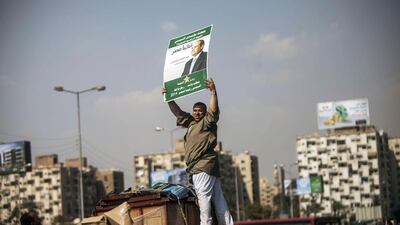CAIRO // Egypt’s former military chief Abdel Fattah El Sisi wants more than just a win in the presidential election that starts on Monday.
A respectable turnout would provide an endorsement of the overwhelming front-runner’s decision to remove the Islamist president Mohammed Morsi last year, and also prove to the West that it was an expression of the will of the people.
Mr El Sisi’s only rival in the vote, which ends on Tuesday, is Hamdeen Sabahi, a veteran leftist politician whose involvement in politics dates back to his student days in the 1970s.
Mr Sabahi, 60, finished third in the last presidential election in 2012, which Mr Morsi won. Although he has marketed himself as a candidate of the “revolution”, a reference to the 2011 uprising against longtime ruler Hosni Mubarak, many of the youth leaders who led that movement are boycotting the vote, branding it a farce.
The question of turnout has taken added importance after fewer than 40 per cent voted in a nationwide referendum in January on a new constitution drafted by a mostly secular panel named by the military-backed interim president Adly Mansour.
Turnout for the referendum was affected by an Islamist boycott of the vote, though it was still slightly higher than in a 2012 referendum on the previous constitution drafted by Islamists during Mr Morsi’s tenure.
With 19.9 million “yes” votes, analysts saw the January referendum as an approval of Mr Morsi’s removal but it was not the resounding endorsement Mr El Sisi was looking to secure.
Turnout in the run-off stage of the 2012 presidential election, Egypt’s first free and fair ballot, which pitted Mr Morsi against Mubarak’s last prime minister, Ahmed Shafiq, was about 52 per cent. Mr Morsi won with 13,230,131 votes, defeating Mr Shafiq’s 12,347,380 votes.
Mr El Sisi is looking to vastly improve on these numbers, not an easy task given that the election is being boycotted by secular and pro-democracy youths as well as Islamists.
That the outcome appears almost certain may also discourage many of the 53 million registered voters from casting ballots.
Great expectations
Even if Mr El Sisi secures a strong turnout and a resounding victory, that will do little to shield him against public anger if he fails to make quick progress on some of the nation’s most pressing problems.
The pressure for Mr El Sisi, 59, to bring about change could not be higher. Many Egyptians see the election as the end to the turmoil that has roiled their country since the overthrow of Mubarak’s 29-year regime.
Mr Morsi’s Muslim Brotherhood and its Islamist allies have been staging near-daily protests since last July and they have been met with a government crackdown that has killed hundreds and jailed thousands.
Islamic militants have meanwhile been targeting police, army troops and government officials in a campaign of suicide attacks, bombings and shootings that began in the Sinai Peninsula and has now spread across much of the country.
The turmoil has been playing out against a backdrop of a woeful economy, with all major sectors hard hit since 2011. Adding to the woes of the nation are daily power blackouts, surging crime and a steep rise in food prices.
Mr El Sisi is acutely aware of the challenges ahead. In a series of recent television interviews, he promised to make security and the economy his top priorities.
He has been less emphatic when it came to issues of democracy, freedoms and human rights, although he has, in general terms, declared his commitment to the rule of law and human rights.
Mr El Sisi, however, declared that a new, anti-protest law that places restrictions on political gatherings without a police permit would stay if he is elected, an assertion likely to anger pro-democracy youth groups.
Already jailed under that law are some of the most prominent activists behind the 2011 uprising and the mass anti-Morsi protests that preceded his July 3 removal.
Critics are also claiming that some elements of the Mubarak regime have returned, with Mr El Sisi’s campaign attracting figures from the ousted leader’s now-dissolved National Democratic Party.
Mr El Sisi has countered the criticism by vowing repeatedly that there would be no return to Mubarak-era practices.
foreign.desk@thenational.ae

